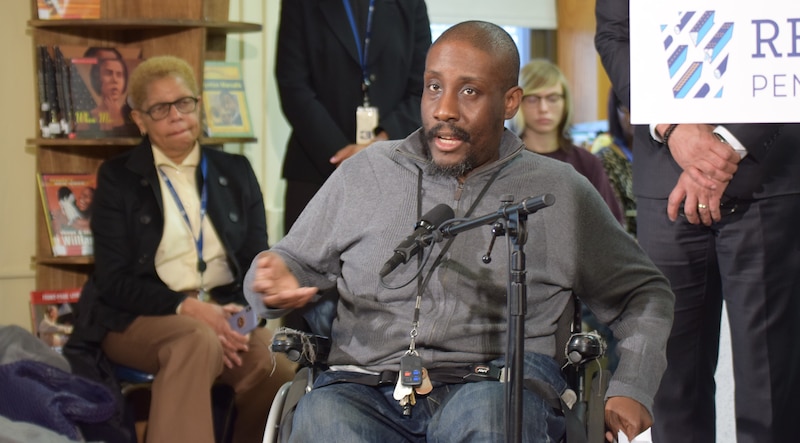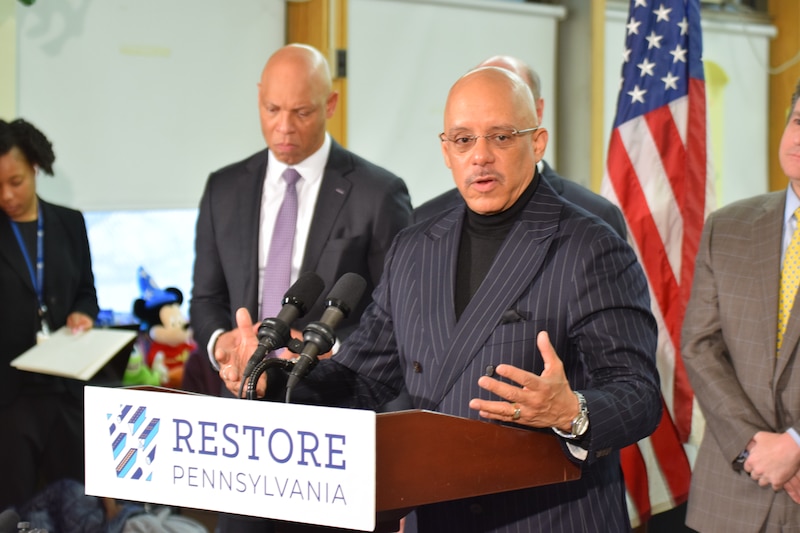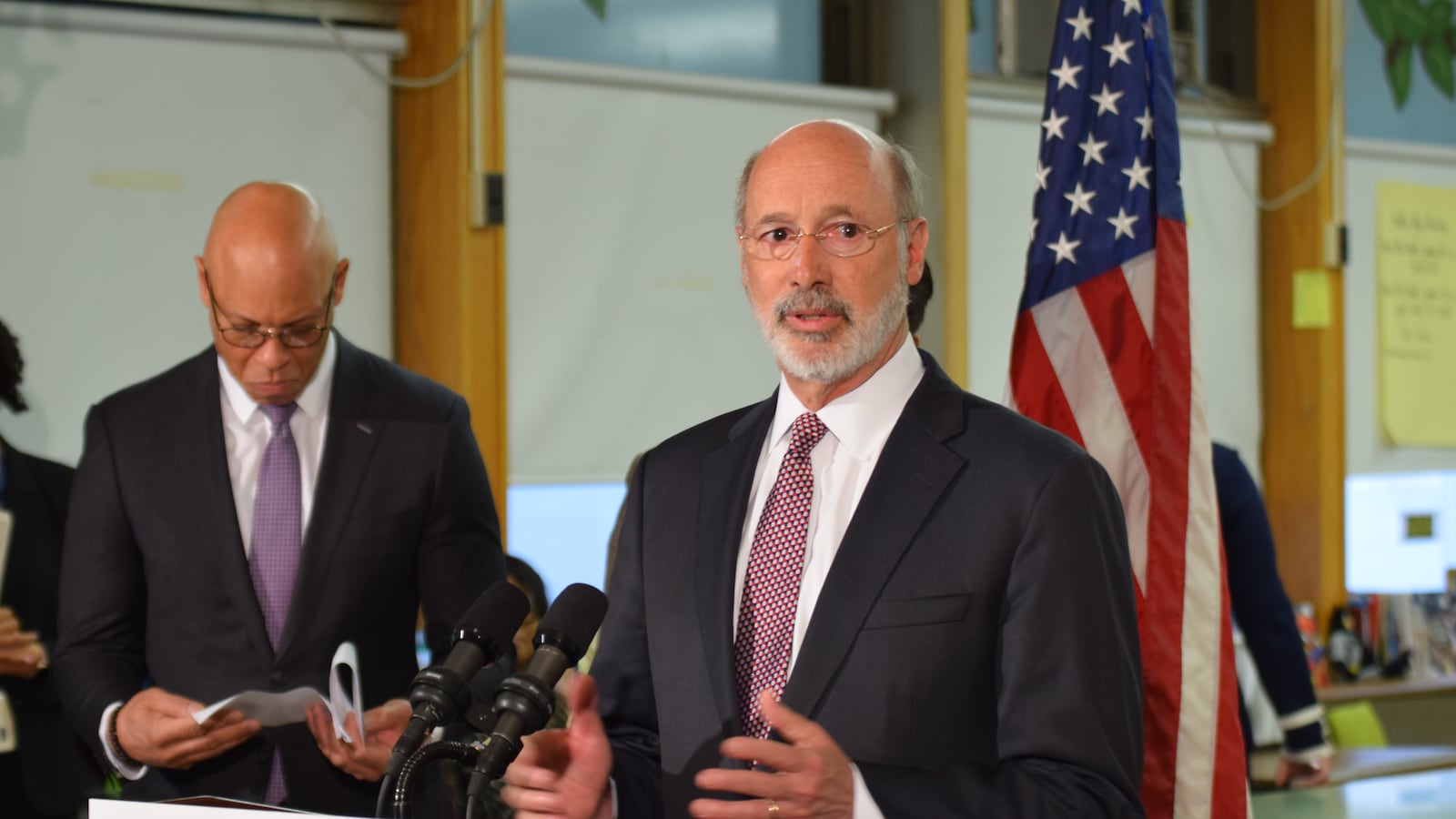This article was originally published in The Notebook. In August 2020, The Notebook became Chalkbeat Philadelphia.
On Thursday, Gov. Wolf proposed spending $4.5 billion over the next four years to repair school buildings, blighted areas, and storm damage, as well as expanding broadband internet into rural areas that don’t have coverage.
Wolf announced the legislation during a visit to John Taggart Elementary School, which serves grades K-8, in South Philadelphia. He toured classrooms where lead paint was remediated as a result of the $7.6 million allotment from the state for lead paint stabilization, and mold and asbestos removal. Wolf said the amount was “a nice start,” but not nearly sufficient. And other districts also need assistance.
The governor said that although the amount he proposed might seem large, it’s far less than what would be needed if the schools decay to the point where they must be rebuilt from scratch. For years, parents have been demanding money to repair schools, and the state government has balked, saying that it doesn’t have the funds.
“So what we’re basically saying is that we’re OK with creating the conditions that allow schools to deteriorate in the heart of neighborhoods,” Wolf said. “We’re also letting those neighborhoods deteriorate.”
Wolf is calling his proposed program Restore Pennsylvania, which would be paid for by what he called a modest tax on natural gas. The proposed legislation that would set up Restore Pennsylvania is separate from the state budget process, during which Wolf has unsuccessfully proposed natural gas taxes in the past.
“Restore Pennsylvania will address issues of blight and issues of remediating school buildings like this,” Wolf said. “There’s a lot to do in every community all across the commonwealth. And $5 billion could actually give Pennsylvanians, Pennsylvania communities, Pennsylvania schools and families a chance to get back on their feet.”
If the plan passed, the state would issue $4.5 billion in bonds over the next four years, which would be paid off over 20 years through the roughly $300 million raised each year by the natural gas tax.
Pennsylvania has the second-highest natural gas production in the country. The third-highest state, Oklahoma, produces less than half the amount of natural gas annually and brings in $1 billion each year in natural gas taxes. Texas produces a bit more natural gas than Pennsylvania, and it also collects $1 billion annually in taxes.
“We’ve got an unusual and unique opportunity in Pennsylvania. Every other natural-gas-producing state in the country has a tax,” Wolf said. “Texas, Louisiana, Oklahoma. These are not out-of-the-box kind of states — they’re very conservative.
“We would be revitalizing neighborhoods. We’d be recreating a healthy core in those neighborhoods. It’s a start. There’s more we have to do, but it’s a start.”
Wolf said that the legislation already has “broad bipartisan support” and that he was hoping it could pass before the budget negotiations this summer.
Attaching the revenue from the natural gas tax to specific infrastructure investments addresses the fear that part of that revenue would be used in the state’s operating budget. That should make the proposal palatable to many Republicans who voted against budgets containing the tax.
And Wolf said he wasn’t convinced that the natural gas tax, or severance tax, is actually unpopular with Republicans.
“Two years ago, the Senate actually passed the severance tax as part of the budget proposal. And by my count, it would have passed the House if it ever came up for a vote,” Wolf said.
Superintendent William Hite welcomed the governor to Taggart, pointing out that the school is more than 100 years old. Half the District’s buildings are over 70 years old.
Using the state money allotted so far for lead paint stabilization, work in 30 schools will be completed by the end of the summer and work in the remaining 16 schools will be completed in the next school year.
Hite said, “Even after we use all the [state] grant money, and the funds that the District’s operating budget has provided, there’s still significant amounts of work to be done. That’s why we are all advocating for a reliable source of funding. We’re not going to address the District’s $4.5 billion in deferred maintenance needs with a collection of one-time funds.
“We need a recurring source so we can have a long-term plan to address these things and assure that buildings we fix don’t fall back into disrepair. It’s really important to our neighborhoods. … We don’t get good neighborhoods without good schools.”
Derek Baxter, the parent of a 3rd grader at Taggart and the president of the School Advisory Council, spoke about what his neighborhood school means to him.
“Since we got here, I feel like part of the family,” Baxter said. “Being a disabled parent — as well as my wife — it’s difficult for us, but we’re also able to achieve our goal: to make this a better school for everyone that’s involved in Taggart, from students to staff and parents — everyone.”
Baxter is working with the school’s welcome center to bring in new parents and trying to get more parents to volunteer at school.

Derek Baxter, a Taggart parent and president of its School Advisory Council speaks, as Board of Education President Joyce Wilkerson (left) listens. (Photo: Greg Windle)
State Sen. Larry Farnese (D-Phila.) pointed out that Pennsylvania sits on one of the largest natural gas reserves in the world.
“This relationship is not short. This is a long-term relationship that this state has made with the natural gas industry,” Farnese said.
State Sen. Vincent Hughes (D-Phila.) said that the situation is as if “a check has gone uncashed” during 10 years of untaxed corporate profits from Pennsylvania’s natural gas fracking industry.
If a proposal like Wolf is making now had been enacted 10 years ago, Hughes said, “we would have gotten about $3-$4 billion over that 10-year period. Be glad Farnese or I are not the governor, because it would have been a much more aggressive proposal.”
Hughes also worked with Republican State Sen. Pat Browne of Allentown to draft a simplified version of the state’s PlanCon program, which partially reimbursed school districts for certain construction projects before it was defunded by former Republican Gov. Tom Corbett. Hughes and other state senators are trying to reinstate the program.
But Hughes said the two programs are not mutually exclusive because PlanCon never provided enough funding and it was used to reimburse schools for long-term projects, not to pay for urgent remediations.
“The idea is to create a pool of funds that can be much more aggressive, quicker, to get into schools and deal with problems,” Hughes said. “Sometimes the PlanCon process can be very cumbersome. … It can take years to get done. We can’t wait that long. This is an emergency. There’s a crisis.
“The public school infrastructure is the second-largest infrastructure after our roads and bridges. It’s unconscionable that children are in classrooms where there’s mold, there’s infestations, there’s lead and asbestos.
“It is not asking a lot, from some of the wealthiest corporations in the world, to invest in other parts of the state’s economy so that we can all grow.”

State Sen. Vincent Hughes speaks about the governor’s new Restore Pennsylvania proposal. (Photo: Greg Windle)


